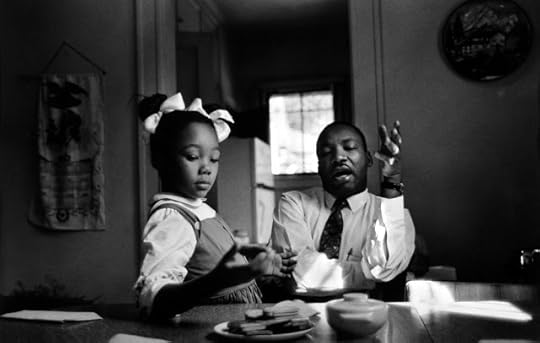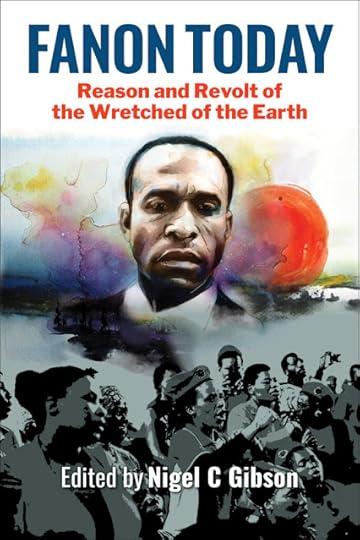Mark Anthony Neal's Blog, page 103
March 3, 2022
Smithsonian Curator Reflects on Intimacy of Photos of Martin Luther King Jr., Others in Collection

'NPR's Walter Ray Watson recently spoke to Smithsonian curator Aaron Bryant about Black photography and history. Bryant is a curator of visual culture at the National Museum of African American History and Culture in Washington, D.C. He focused on a couple of images from Harlem, part of the Smithsonian's collection.'
Conversations in Atlantic Theory • Rosemere Ferreira da Silva, Nigel Gibson, and Lou Turner on Fanon Today: Reason and Revolt of the Wretched of the Earth

'A discussion with three scholars of Frantz Fanon’s work and legacy. Rose Ferreria da Silva, Professor at State University of Bahia in Brazil, who writes on race, politics, Afro-Brazilian literature, and comparative ethnic and African studies, speaks to Fanon’s legacy in Afro-Brazilian thought and political movements. She is joined by Lou Turner, who teaches Black political thought and its radical iterations in the Department of Urban and Regional Planning at University of Illinois in Urbana-Champaign, Illinois and argues for the centrality of Fanon for the Black radical tradition. They are also are joined by Nigel Gibson, who teaches in the Institute of Interdisciplinary Studies at Emerson College in Boston, Massachusetts, and is the editor and author of numerous articles and book-length treatments of Fanon’s work, including the work we are discussing here – Fanon Today: Reason and Revolt of the Wretched of the Earth, published by Daraja Press in 2021. Discussion covers the nature of Fanon’s ability to travel as a theorist across time and geography, the persistence of anti- and post-colonial questions, and the relationship between political theory, decolonial thought, and movements across the global south.'
Hollywood’s Fraught History with Black Audiences

'There has been an explosion of popular and acclaimed work from Black creators on film and television in recent years. This is no fluke—it’s the latest instance in a pattern that has repeated across film history. As the film scholar Aymar Jean Christian tells the The New Yorker Radio Hour’s Ngofeen Mputubwele, industry players “always use the Black audience to draw people back into theaters when they’ve lost the audience in some other way.” Christian points to Blaxploitation films, which in the nineteen-seventies pulled the industry out of a viewership slump, and to the so-called ghetto pictures, which brought audiences back into movie theaters, despite the growing appeal of television. So what accounts for the current surge of Black stories coming out of Hollywood? “I really think it was Django Unchained, ” Christian says. After studio consolidation limited opportunities for Black creators in the early two-thousands, Christian believes, Tarantino’s film reminded Hollywood that “Black people like movies, that we deserve movies.” But, for as much progress as there has been, Christian argues that there is something missing in today’s film landscape: stories about the Black experience beyond trauma. “I think we also need stories about solidarity, about how to love each other, about how to heal,” Christian says. “And I just don’t think that this hyper-capitalist, hypercompetitive environment is really incentivizing that kind of storytelling”.'
March 2, 2022
Farming While Black, Sowing the Seeds of Racial Discrimination in Farming

'For nearly half a century, "racial discrimination in agriculture, exclusion from federal relief programs, and laws that preyed upon the economically disadvantaged" squandered the number of Black farmers from nearly one million in the 1920s to less than 50,000 today. President Joe Biden signed The American Rescue Plan into law in March of 2021 which included $5 billion for farmers to address a history of racial discrimination in the USDA and provide debt relief for farmers of color during Covid. Not only have many farmers of color not received a dime, the USDA has sent letters of foreclosure to those farmers who are behind in their loan repayments. John Boyd Jr., Founder and President of the National Black Farmers Association and April Simpson, senior reporter at the Center for Public Integrity joined The Takeaway to talk about farming while Black.'
Half a Century Ago, Stevie Wonder Defined What an 'Artist's Classic Run' Could Mean

'It's been called "The Greatest Creative Run in the History of Popular Music" – and it started 50 years ago this week. Stevie Wonder released five brilliant albums in the span of five years, between 1972 and '76: Music of My Mind, Talking Book, Innervisions, Fulfillingness' First Finale and Songs in the Key of Life. Three of them won Grammys for Album of the Year. Morning Edition's A Martinez spoke with poet and cultural critic Hanif Abdurraqib about this "classic period" of Wonder's, saying its story begins with the album just before that historic quintuple run, called Where I'm Coming From.'
Left of Black S12 · E13 | Black Women of the Southhampton Slave Revolt with Vanessa M. Holden

Nat Turner, a preacher and slave in Southhampton County, VA, organized a small group of loyal followers and mounted a terrific and terrorizing rebellion against the plantation system, killing around 60 white people as they plowed their way to a nearby armory. The insurrection was quelled by the state militia, eventually leading to Turner's trial and execution. But his capture was prolonged for six long weeks. How was the slave leader sustained during that time? And where are the enslaved women of Southhampton County in the narrative of this historical event? Dr. Vanessa M. Holden joins Left of Black host and Duke University Professor Mark Anthony Neal to discuss her latest book, Surviving Southampton: African American Women and Resistance in Nat Turner's Community, published by University of Illinois Press. Dr. Holden is an Associate Professor of History and African American & Africana Studies and the Director of the Central Kentucky Slavery Initiative at the University of Kentucky.
The Limits with Jay Williams: NFL Legend Deion Sanders on HBCUs and Raising the Next Generation of Black Athletes

'NFL legend Deion "Coach Prime" Sanders sits down with host Jay Williams to talk about his latest chapter coaching college football. The two-time Superbowl champion decided to bet on HBCUs as the future of the NFL, successfully making what Sports Illustrated has dubbed one of the most shocking recruits in college football history. The head coach of Jackson State University now feels his calling is to raise the next generation of young, Black athletes. He's coaching them to be better on and off the field, and he's advocating for them to finally get paid for their name, image, and likeness. As Sanders puts it, his tenure as a coach is "not a moment, but a movement." And just as with his own NFL career, Neon Deion is building the kind of coaching record that proves his critics wrong.'
Barry Jenkins on How Black Directors Have Transformed Filmmaking

'The film Moonlight is a subtle, intimate portrait of a young man named Chiron, coming of age during the crack epidemic and struggling to understand his sexuality. The film won Best Picture at the 2017 Oscars, and it made Barry Jenkins one of the most celebrated young directors working today. For Jenkins, today’s flood of Black creativity in Hollywood was helped along by the visibility of the first Black President, Barack Obama. “It meant that, if you walked into any room, this wasn’t going to be the first time someone had to see someone like me walk into that room,” Jenkins says. “And they weren’t going to be surprised or taken aback by the things that we had to say, by the things that we wanted.” Jenkins talks with David Remnick about using light and sound in his films to tell stories. “As a Black storyteller, I’m always just trying to get closer to myself, closer to the truth of who I am, in the creation of these images,” he says. “We’re just building out this tapestry of, hopefully, getting at the ineffable process of understanding or expressing what it is to be Black in the world today”.'
Alan W. King in The Black Writer's Studio

'Alan W. King is a Caribbean American poet, whose parents emigrated to the U.S. from Trinidad and Tobago in the early 1970s. He is a father, husband, and author of two full-length collections of poetry: Point Blank and Drift. Plan B Press published his recent chapbook, Crooked Smiling Light. King's poetry caught the attention of U.S. Poet Laureate Joy Harjo who said: "Alan King is one of my favorite up-and-coming poets of his generation. His poems are not pop and flash, rather more like a slow dance with someone you're going to love forever".'
March 1, 2022
The Pandemic Real Estate Boom Is Driving Up The Costs Of Farmland -- And Pricing Farmers Of Color Out

'Small farmers have faced challenges acquiring land for decades. That's especially true for farmers of color, who own just two percent of farm businesses across the country. Now, the pandemic has made those problems worse. Demand for housing in rural areas has soared. That's driven up the cost of farmland outside of New York City, and is pricing farmers out. Greta Moran is a senior reporter covering this issue for the website Civil Eats. Dr. Gabriella Pereyra is the co-director of the Northeast Farmers of Color Land Trust. They spoke with WNYC News's Michael Hill.'
Mark Anthony Neal's Blog
- Mark Anthony Neal's profile
- 30 followers



